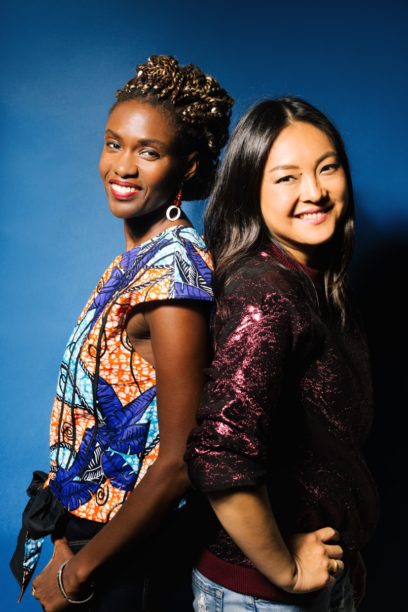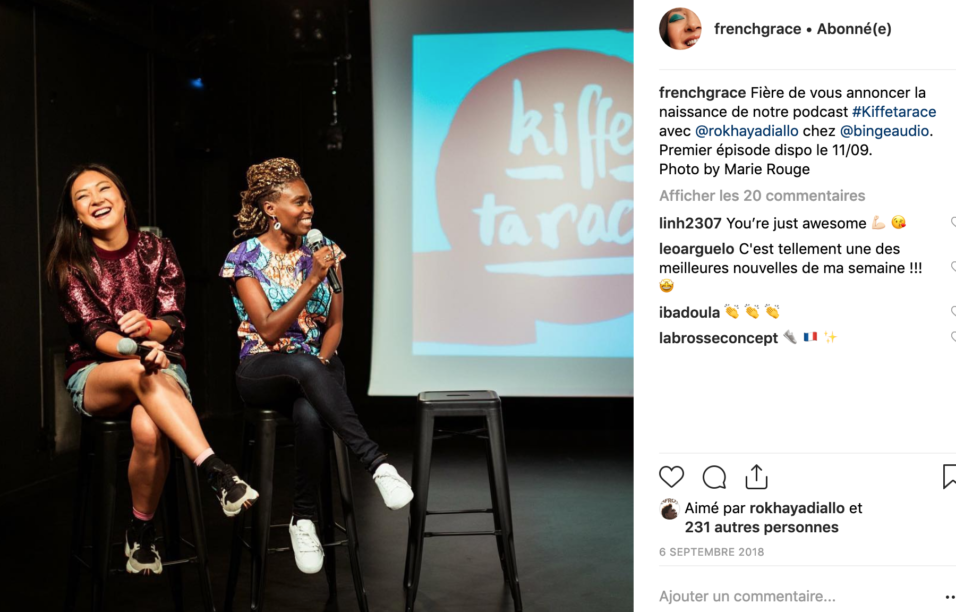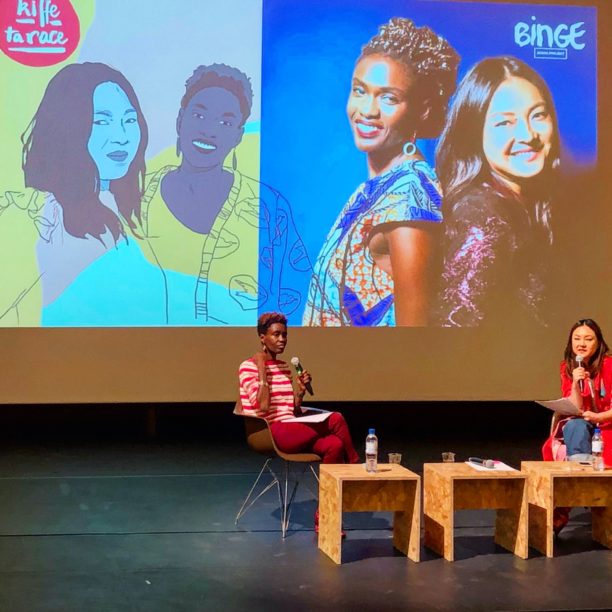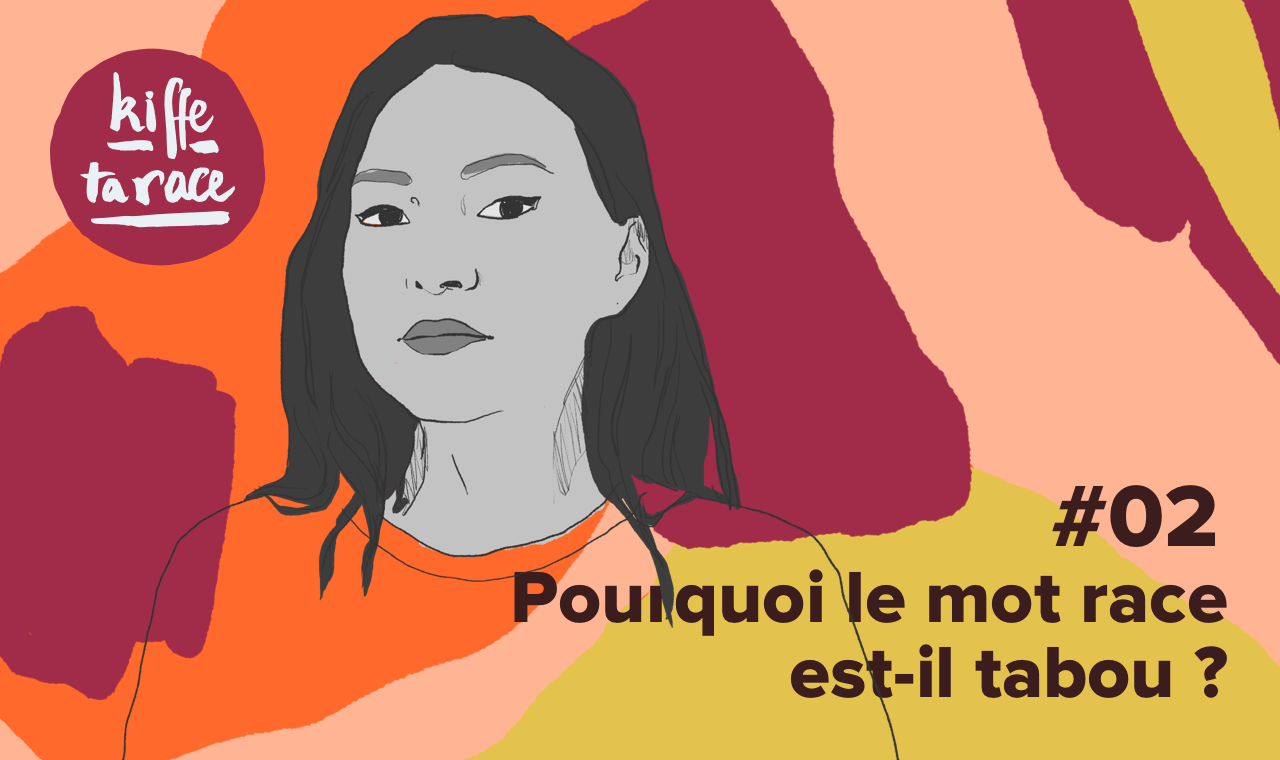“Bonjour Rokhaya”
“Bonjour Grace”
“Welcome to the new episode of Kiffe ta Race, the podcast that jumps headfirst into issues of race.”
“Here we talk frankly about Arabs, Asians, Whites, Roma, and Blacks…”
This is how Rokhaya Diallo and Grace Ly start each episode of Kiffe ta Race. The podcast’s title is ironic. It comes from the expression in slang “kiffer sa race,” which translates loosely to “really liking something” or “getting into a thing,” and it doesn’t literally have anything to do with race. Except it’s all about race, which is exactly the point: if the word “race” has no scientific validity when applied to humans, nevertheless, there it is. Kiffe ta Race is about racism and discrimination in French society, something that isn’t going away, even when it’s officially not there.
It is forbidden by law in France to collect statistics on ethnicity or religion, and communautarisme, community identity, is a dirty word, but this 35-minute podcast is about race, ethnicity, and discrimination in everyday life. Podcasts are still fairly new in France, but when Kiffe Ta Race launched last fall, produced by Binge Audio, it quickly became apparent that these Parisians were onto something: two months after the launch they were featured in a major cultural magazine, and four months later ranked in the top 25 independent podcasts. Fourteen podcasts later, they’ve talked about Asians as “the model minority,” whether Whites have a color, the lack of people of color in the arts, how to be a good ally to people who face discrimination, and the most recent podcast is about misconceptions in the public and private sphere about Roma people.
Diallo is black and Ly is Asian, and they talk fast and laugh a lot; their casual conversations usually include an expert or a well-known writer who they always introduce by asking them to describe themselves—White, Black, Asian, etc.—and the trio discuss subjects such as “why the word ‘race’ is taboo,” or “Geishas, panthers or gazelles—can you have a sexual preference for an ethnic type without being a racist?”
France has long considered itself a colorblind society; the French are citizens of a secular republic before anything else. “France shall be an indivisible, secular, democratic and social Republic,” as the first article of the 1958 Constitution states; “It shall ensure the equality of all citizens before the law, without distinction of origin, race or religion.”
In 2018, arguing that humans belong to the same biological race, and that the word “race” was outdated, members of parliament voted to remove the word from the Constitution and replaced it with “sex,” ensuring that citizens would not be singled out by gender, either. But anti-racism groups were against the change, claiming that in order to fight racism, there must be a word to name it.
The word “race” was first introduced into the French Constitution in 1946, as a rebuttal to racist ideology disseminated by Nazi Germany and France’s collaborationist Vichy government, which used racial statistics to deport 76,000 Jews from France and intern over 6,000 Roma. In post-war France, official colorblindness must have felt like a step forward, fitting in nicely with French universalism and the country’s maxim dating back to the French Revolution, liberté, égalité, fraternité. But of course, race as a social construct exists, even if France refuses to see it; in daily life, ordinary racism, racisme ordinaire, can be subtle or explicit, but it is as ordinary as its name. Yet because the government refuses to compile statistics, it takes private studies to show that Blacks and Arabs, for example, are stopped far more often by the police, and have a harder time finding a job.

The term racisme ordinaire gets Grace Ly going. Sitting demurely in a café in Belleville, in northern Paris’ multi-colored neighborhood, where the Binge Audio studios are located, she ranted; “Ordinary for whom? It’s a concept that was devised by people who are racist… when you are non-white, even if you were born in France and are French, you are not seen as French.”
Ly and Diallo have a lot in common; both studied law, and both became filmmakers and writers. They met professionally in 2015 and then became friends. “We talked about how, although our backgrounds are different, we are French but we’re different French. We always have to reconfirm to people that we’re French. We decided we wanted to talk [publicly] about a number of topics, reflecting on our place in society and in the public space.”
They toyed with the idea of creating a TV talk show and even made a pilot, but “TV wasn’t ready for us,” they were told by producers. “We thought if we have to change things maybe it’s not the right media. Podcasts were pretty new in France so we thought we’d try that. It’s a uncensored form of expression and in the end, I think it was a good thing we chose it,” said Ly.
In February, a week before meeting Ly in a café, the podcast had garnered so many reactions in the form of tweets and emails that she and Diallo decided to host a live recording session to revisit previous episodes, talk about the feedback, and take questions from the public. Aptly held in Paris’ Museum of Immigration, originally built in 1931 to represent France’s colonial conquests and their contribution to the arts, the auditorium was packed.


When I arrived, people were crowding into their seats and the excitement was palpable. Diallo, wearing shiny pink boots, and Ly, wearing brilliant red ones, sat on stage in front of the audience and skimmed over the subjects of their podcasts, stopping to illustrate on a screen the positive and sometimes violently negative reactions to them, mostly via Twitter, and then opened up the floor to questions. The audience–mostly (but not only) young and non-white–hung on every word, nodding, and clapping at regular intervals. “France is not white,” Diallo declared, to evident approval. “The moment it stepped onto its colonies, it ceased to be white.” France was still present on five continents, she reminded the audience, with “overseas departments” still in the Caribbean, Pacific and Indian oceans.
Diallo has a larger presence in the French media than Ly and is attacked more often on social media. In 2017 she was appointed to a government advisory body on digital policy, but was forced off, a week later, following accusations from the far right to the left that she was too outspoken about institutional racism. (The director and most of the commission’s members then resigned). But while Ly is just as forthright as Diallo, “People take aim at me because they have racial prejudices about Asians,” Diallo explained later in a telephone interview. “They think I’ve influenced Grace. There’s this bias of the nice Asian and the aggressive Black. What we do destroys the myth of the silent Asian. It puts us on equal footing. I’ve had Blacks and Arabs tell me they had no idea there were prejudices towards Asians.”
As fans reluctantly left the auditorium, some thronging around Diallo and Ly and others getting to know each other, I spoke with Djeinabou Diallo-Kanté, an investment banker who was born in northern France and whose parents are from Guinea and Senegal. She said she had discovered Kiffe ta Race from Rokhaya Diallo’s Instagram feed. “It was late at night and finding the podcast was like a breath of fresh air,” she said. “I listened to all the podcasts in one go and loved all of them and the angles they took on themes that aren’t new. It reassured me that I wasn’t alone in my daily life and it did me so much good.”
Gilles Horvilleur, a (White male) computer analyst and writer said Diallo and Ly’s exchanges reminded him of the Franco-Swiss intellectual Madame de Staël’s salons in the 19th century. Madame de Staël described witty conversation as producing “at will a sort of electricity that causes sparks to fly, and that relieves some of the burden of their excess vivacity and awakens others from a state of painful apathy.”
When we met in Belleville after the live podcast, I asked Ly about upcoming themes on Kiffe ta Race. Anti-Semitism is on their list, and any topics they think are inescapable that concern the most visible minorities, before moving on to more thorny subjects, like intraracial prejudices—racism within communities themselves.
“We explain concepts, but we’re not educators,” Ly told me; “we want the podcast to be accessible to everyone, always in relaxed conversations.” Their personal reflections make the podcast all the more engaging, as when Diallo explains how she grew into her identity as a black woman because she was one in the eyes of others. Or Ly’s recollection of giving birth, and being told by a doctor that the baby would need to be tested for jaundice because he couldn’t tell from skin color alone. Ly also professed her own ignorance about Muslim women in one of their more recent podcasts, with Justine Devillaine, the (White, atheist) co-founder of Lallab, an association that helps Muslim women’s voices be heard. Devillaine started out as a feminist but said that she realized that fighting for women’s rights in a mainstream white feminist movement meant that she wasn’t fighting for all women. “If I wanted to be honest with my feminism and what I wanted—a fair and just society for all women—then I needed to work alongside women who were the most ostracized, the sum of all discrimination.”
Discovering that feminist Muslim women exist was a new experience for Ly. “But you knew me,” interjected Diallo. “Yes,” Ly responded, “but I knew you as a Black woman and we never talked about your religion…I had clichés about Muslim women.”
Though they don’t consider the US a model to strive for, Diallo and Ly often quote statistics and studies on ethnicity carried out from sources in the US. “In France, statistics and surveys are simply not available,” Diallo explained when I asked her about this over the telephone. “There are some academics doing research in a few universities in France but within the geography, sociology, anthropology, or history departments.” No specific race or ethnicity departments exist in French universities, said Diallo, still, there are academics who are carrying out such research, such as sociologist and anthropologist Nacira Guénif-Souilamas or social scientist Maxime Cervulle, both of whom have been guests on the podcast.
So how would Diallo and Ly explain the differences between racism in France and in the US?
“France sees itself as a country of Whites. Minorities are seen as external to the country. This means that you have to permanently justify that you’re French. Hyphenated identities don’t exist,” she said. “Then you have the anti-racist movements, which in the US were led by minorities. In France the first marches and movements were co-opted by the government. Until 2005 mainstream anti-racism movements didn’t pay attention to communities.”
Ly reflected that racism in France is both head-on and underhanded. “The French think that to be politically correct is very American. Their love for freedom of speech means that [racist] people are given a public space because not to give it to them would be restricting their so-called freedom of speech.
“Also, France never had slaves on its home territory, domination was far away, in the colonies. The US was familiar with slavery and civil rights; it was something that everyone knew about.”
With their podcast, Diallo and Ly have succeeded in opening up a space in French media with casual straight talk about racism. “I used to have these kinds of discussions in private,” said Ly. “What we talk about on Kiffe ta Race wouldn’t have interested anyone a few years ago. Today we are occupying a public space and giving people a place where they can express themselves, which is already something. There’s a solidarity that is being established and it feels good.”
Olivia Snaije






